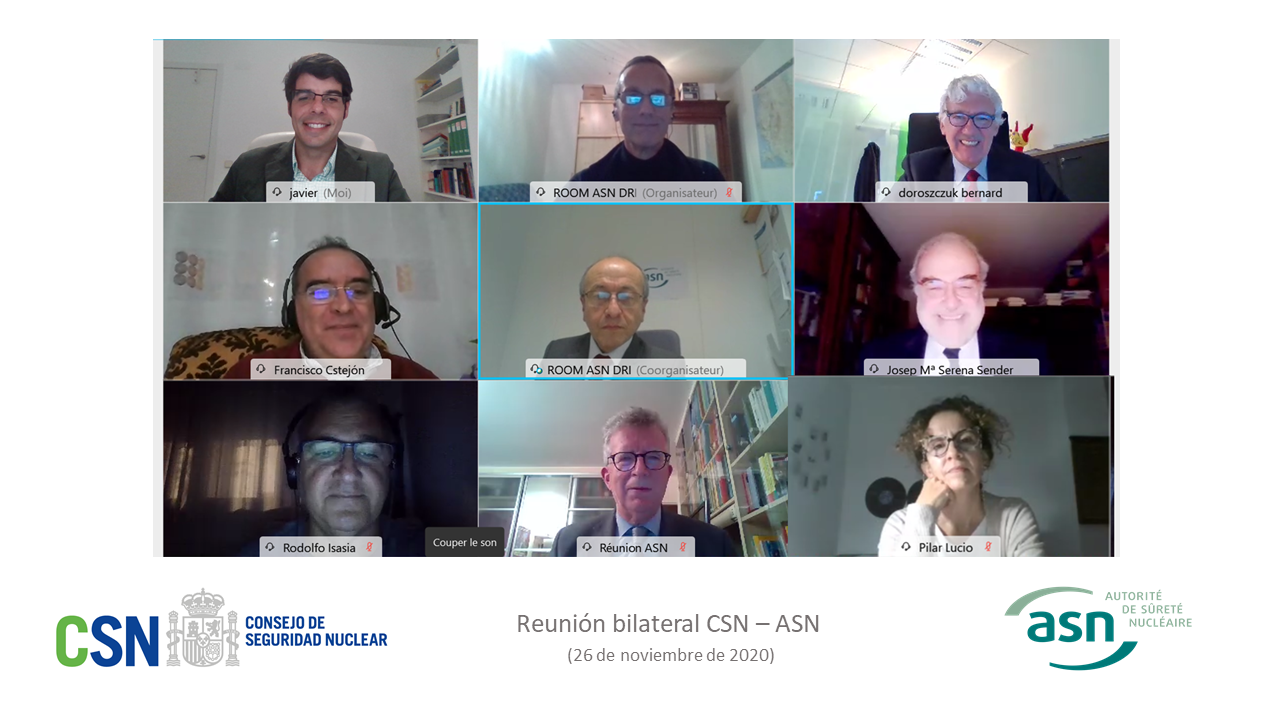Contenido principal
2020
The Nuclear Safety Council and the Nuclear Safety Authority of France highlight the importance of cooperation through their annual bilateral meeting

The Nuclear Safety Council (CSN) and the French Nuclear Safety Authority (ASN) have held their annual bilateral meeting through telematic means, thus maintaining its desire for cooperation despite the restrictions by health conditions due to COVID-19.
The Spanish delegation was formed by the president of the CSN, Josep Maria Serena i Sender and the commissioners Francisco Castejón and Pilar Lucio, among other members of the regulator. On behalf of the ASN, its president, Bernard Doroszczuk, and the commissioners Philippe Chaumet-Riffaud and Jean Luc Lachaume atended the meeting.
The conference allowed the analysis of the key developments and most important activities that both regulatory bodies have carried out since the last meeting on Nuclear Safety and Radiation Protection, as well as specific issues related to the management of the regulatory body in the current times of pandemic.
Josep Maria Serena i Sender began by making a brief presentation of the new CSN Strategic Plan, which covers the period 2020-2025. The president explained how the organization proposes to achieve its strategic goals, aimed at Nuclear Safety and Radiation Protection, and the achievement of the sustainable development goals, and highlighted how communication with society, stakeholders and transparency in its actions will be reinforced by this plan.
Regarding the processes of licensing facilities, renewals of authorizations and other important evaluations, Serena i Sender has highlighted that despite the situation generated by the state of alarm, the CSN has maintained its activities in this field (it favorably reported the request for renewal of the exploitation authorization of the Almaraz and Vandellós II nuclear power plants) and is currently immersed in the evaluation of several renewals, Periodic Safety Reviews and in the licensing of different solutions for the management of spent fuel, among other matters.
Likewise, the president of the CSN has advanced some projects on which the CSN is already working in: the organism's digital transformation plan, the project for the evaluation of the Safety Culture and the establishment of a model for the Systematic Approach to Training- driven by the IAEA-, which adapts training to needs.
For their part, the French delegation has highlighted its strategy in the face of the pandemic, and the most relevant actions in relation to licensing and inspection, such as the long-term operation of its 900 MWe reactor park.
In this regard, commissioner Francisco Castejón has explained the actions carried out by the Spanish regulator since the state of alarm was declared in March and has detailed the continuity plan that the CSN implemented in the face of the pandemic, aimed at prioritizing the relevant issues, the availability of means for teleworking and the maintenance of communication between CSN personnel.
Finally, the agenda of this bilateral meeting has also made it possible to advance in the collaboration between both institutions, updating the work plan where future collaboration issues are raised, which are of interest to both organizations.
This meeting strengthens the excellent relationship that the CSN maintains with its French counterpart, and allows the sharing of information and good work practices. In addition to the bilateral cooperation framework agreement, both entities signed a specific collaboration agreement regarding the planning, preparation and management of nuclear or radiological emergencies.
The next bilateral meeting is scheduled to take place in late 2021 in France, if sanitary conditions allow it.
* Check here the glossary of technical terms *
